Madlener House
4 West Burton Place
Chicago, Illinois 60610
Telephone: 312.787.4071
info@grahamfoundation.org
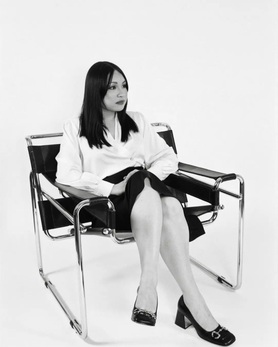
Ellen Phan premieres Tension and Release, a new work of computer music, centering on a series of vulnerable, private therapeutic Neuro-Linguistic Programming sessions with her mentor over the course of three years that focus on releasing grief, people pleasing, inner child work, and navigating the complexities of motherhood.
Ellen Phan (b.1986, Fountain Valley, CA) is a computer music artist. Her work focuses on creating multi-dimensional frequencies using a variety of processing and synthesis with a distinct hallucinatory, dissociative, psychoacoustic sound world inspired by the Superconscious.
She has performed at CCRMA (Center for Computer Research in Music and Acoustics), Stanford University; Algorithmic Art Assembly, San Francisco; Hangar, Barcelona; The Geffen Contemporary at MOCA, Los Angeles; Desert Daze Festival, Lake Perris; Corridor Festival, Seattle; and Indexical, Santa Cruz. Her music has been published by Bánh Mì Verlag, Anòmia, Nada Recs and LOL Editions, with a forthcoming release on Rope Editions. Phan also has a hypnotherapy practice, and her work in hypnotism informs her approach to sonics. She lives in Los Angeles.
Since 2010, the Graham Foundation has partnered with Lampo to produce an international performance series held at the Madlener House. Lampo, founded in 1997, is a nonprofit organization for experimental music and intermedia projects.
Lampo, established in 1997, supports artists working in new music, experimental sound, and other interdisciplinary practices. The Chicago-based organization's core activity has been and remains its performance series. Rather than making programming decisions around tour schedules, Lampo invites selected artists to create and perform new work, and then the organization provides the space, resources, and curatorial support to help them fulfill their vision. Lampo also organizes artist talks, lectures, screenings, and workshops, and publishes written and recorded documents related to its series.
Note: This event will be held in the ballroom on the third floor of the Madlener House, which is only accessible by stairs. The first-floor galleries and bookshop are accessible via outdoor lift. Please contact us at 312.787.4071 or info@grahamfoundation.org to make arrangements.
Photo: Rei Hertzler
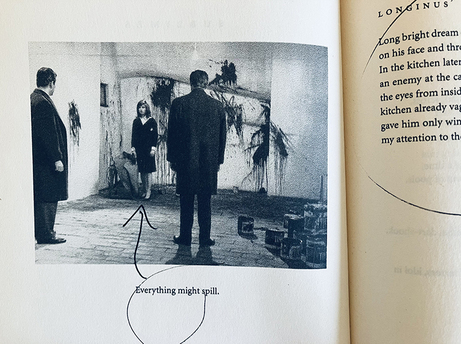
"Deadtime" research photo with Cally Spooner's annotations in "Decreation" by Anne Carson (Vintage, 2006), 2018/2023. Photo: Cally Spooner
February 17th, 2024, 10:00am - 7:00pm
The Graham Foundation (Ballroom), Chicago
With: Nuar Alsadir, Marquis Bey, Wendy Brown, Joshua Chambers-Letson, Tony Cokes, Hendrik Folkerts, Melody Giron, Irena Haiduk, Sarah Herda, Darrell Jones, Sanford Kwinter, Ralph Lemon, Maggie Segale, Cally Spooner, and Frances Stark.
A Thesis on Spillage is a symposium-like-gathering unfolding as a diverse set of propositions—philosophical, artistic, psychoanalytical, practical, choreographic. Each proposal defies and eclipses the drive for individual and societal bodies to perform towards a metric-orientated future; a future which represses anything that cannot be quantified, instrumentalized, tracked, or rated.
Contributors will be presenting their proposals as dance, lectures, talks, screenings, sounds, conversation, and music over the course of the day. While you may enter the symposium-like gathering in your own time–at any time–we suggest you experience its choreography in its entirety.
A Thesis on Spillage is expected to unfold as follows, CLICK HERE
Note: This event will be held in the ballroom on the third floor of the Madlener House, which is only accessible by stairs. The first-floor galleries and bookshop are accessible via outdoor lift. Please contact us at 312.787.4071 or info@grahamfoundation.org to make arrangements.
Registration does not require attendance for the full program. Note that the event breaks for lunch and resumes for the afternoon. Lunch is not provided.
Cally Spooner is an artist who exhibits performances that unfold across media—on film, in text, as objects, through sound, and as illustrated in drawings. Recent institutional solo exhibitions have taken place at Cukrarna, Ljubljana; Museum Dhondt-Dhaenens, Sint-Martens-Latem; Parrhesiades, London; the Art Institute of Chicago; the Swiss Institute, New York; Castello di Rivoli, Turin; Centre d’Art Contemporain Genève; the New Museum, New York; and the Stedelijk Museum, Amsterdam. Her live performances been staged at, amongst others, Tate Britain and Tate Modern, London; Performa 13, New York; the Centre Pompidou, Paris; Museum M, Leuven; and the Institute of Contemporary Arts (ICA), London. Spooner is the author of recent and forthcoming monographs published by Lenz Press and the Swiss Institute (2023); Hatje Cantz (2020); Mousse (2018); and Slimvolume/Cornerhouse (2016). Her novella, Collapsing in Parts, was published by Mousse in 2012. Spooner is the recipient of numerous awards and prizes, including the Paul Hamlyn Award and the Novo Nordisk Foundation’s Mads Øvlisen PhD Scholarship for practice-based art. She was born in the United Kingdom, is British Italian, and lives and works between London and Turin.
Hendrik Folkerts is curator of international contemporary art and head of exhibitions at the Moderna Museet, Stockholm, where he has curated exhibitions such as Vaginal Davis: Magnificent Product (forthcoming, 2024), Seven Rooms and a Garden: Rashid Johnson and Moderna Museet’s Collection (2023), and Every Ocean Hughes: Alive Time (2022). Folkerts previously was Dittmer Curator of Modern and Contemporary Art at the Art Institute of Chicago (2017–22); curator at documenta 14, Kassel/Athens (2014–17); curator of performance, film, and discursive programs at the Stedelijk Museum, Amsterdam (2010–15); and coordinator of the curatorial program at De Appel arts center, Amsterdam (2009–11). Folkerts has (co)edited various publications and catalogs, most recently Alexandra Bachzetsis’s monograph SHOW/TIME/BOOK BOOK/TIME/SHOW (Roma, 2023), Thinking-in-action: A Conversation between Rashid Johnson and Kevin Quashie (Moderna Museet, 2023), Katalin Ladik: O-oooooopus (Skira, 2023), and Igshaan Adams: Desire Lines (Art Institute of Chicago, 2022). His texts have been published in South as a State of Mind, Mousse Magazine, Artforum International, The Exhibitionist, Metropolis M, Art & the Public Sphere, among others.
Nuar Alsadir is a psychoanalyst, poet and writer based in New York City. Her poetry collection Fourth Person Singular (2017) was a finalist for the National Book Critics Circle Award and the Forward Prize. Animal Joy (Fitzcarraldo / Graywolf, 2022), her first prose work, is a free-associative essay on laughter, spontaneous expression and the elusive idea of feeling alive, which takes in clown school, erotic knowledge, canned laughter, Abu Ghraib, Trump, dance and adjectives.
Marquis Bey is a professor of African American studies, gender and sexuality studies, and English at Northwestern University. Their work focuses on thinking blackness not as racial identification but as “paraontological,” and utilizes this understanding to recalibrate how we might move through questions of non-normative subjectivity—via race, gender, and personhood. Through black feminist theory, trans and nonbinary studies, and abolitionist theory, Bey articulates a project of black trans feminism that is not beholden to a veneration of particular subjects but rather an assertion of the dismantling of the normative constraints that define the world—white supremacy, cisnormativity, and heteropatriarchy as well as the categories of race and gender themselves. Most recently the author of two books—Black Trans Feminism and Cistem Failure: Essays on Blackness and Cisgender (both Duke University Press, 2022)—they continue to work at the intersections of race, gender, and radical politics.
Wendy Brown is professor emerita in the department of political science at the University of California, Berkeley. Professor Brown received her PhD in political philosophy from Princeton University in 1983. Brown’s fields of interest include the history of political theory, feminist theory, contemporary critical theories of law, nineteenth and twentieth century Continental theory, and contemporary American political culture. She is best known for intertwining the insights of Marx, Nietzsche, Weber, Freud, Frankfurt School theorists, Foucault, and contemporary Continental philosophers to critically interrogate formations of power, political identity, citizenship, and political subjectivity in contemporary liberal democracies. In recent years, her scholarship has focused on neoliberalism and the political formations to which it gives rise. Some of her most prominent books include States of Injury: Power and Freedom in Late Modernity (Princeton, 1995); Regulating Aversion: Tolerance in the Age of Identity and Empire (Princeton 2006); Walled States, Waning Sovereignty (Zone, 2010); Undoing the Demos: Neoliberalism’s Stealth Revolution (Zone, 2015); and In the Ruins of Neoliberalism: The Rise of Anti-Democratic Politics in the West (Columbia University Press, 2019).
Joshua Chambers-Letson is professor of performance studies and Asian American studies at Northwestern University. His research focuses on performance theory and contemporary art criticism, Asian American cultural production, legal and political theory, and queer of color critique. At work on a book about queer love and loss, art, and grief, Chambers-Letson’s most recent monograph, After the Party: A Manifesto for Queer of Color Life (NYU Press, 2018) studies contemporary art and performance by queers and women of color who mobilize aesthetics to survive, thrive, and mourn within the annihilating conditions produced by the overlapping forces of racial capitalism, Euro-US colonialism, white supremacy, and cis-heteropatriarchy. Chambers-Letson’s first monograph A Race So Different: Law and Performance in Asian America (NYU Press, 2014) argues that law influences racial formation by compelling Asian Americans to embody and perform recognizable racial identities in both popular aesthetic forms (from theater and opera to rock music), before attending to the way Asian American artists and activists have used performance, theater, and art to contest and disrupt the forces and effects of racialization. With Tavia Nyong’o, Chambers-Letson is the coeditor of José Esteban Muñoz’s posthumous The Sense of Brown (Duke University Press, 2020) and with Christine Mok he is coeditor of Frances Ya-Chu Cowhig’s China Triology: Three Parables of Global Capital (Metheun Drama, 2022). Chambers-Letson serves as a performance editor for ASAP, on the editorial board of women & performance, as a series coeditor for the Sexual Cultures series at NYU Press (with Nyong’o and Ann Pellegrini), and is the 2022–23 Thinker-In-Residence with the Felix Gonzalez-Torres Foundation.
Tony Cokes is a post-conceptual artist whose practice foregrounds social critique. His video, installation, and sound works recontextualize appropriated materials to reflect upon our production as subjects under capital. His recent projects often take the form of text animations with sound functioning as a constitutive, intertextual element, complicating the visual. Cokes' works have appeared in exhibitions at The Museum of Modern Art, New York; Haus der Kunst, Munich; MACBA, Barcelona; Whitney Museum of American Art, New York; Centre Georges Pompidou, Paris; ZKM, Karlsruhe, Germany; and REDCAT, Los Angeles, among others. Cokes' projects have been supported by grants and fellowships from The Rockefeller Foundation, John Simon Guggenheim Foundation, Creative Capital Foundation, National Endowment for the Arts, New York Foundation for the Arts, and New York State Council on the Arts. In spring 2014, Cokes was a Residential Fellow at Yaddo, Saratoga Springs, NY. Cokes is a professor in media production and director of undergraduate studies, department of modern culture and media at Brown University.
Cellist Melody Giron, a native of Boston, began her musical studies at the age of four at the New England Conservatory of Music Preparatory School. She has since established herself as a versatile performer, appearing as a soloist, chamber musician, and orchestral player in the United States, Europe, and Asia. Currently splitting her time between New York and Boston, Giron's diverse portfolio encompasses new music premieres, orchestral engagements, chamber music, Broadway theater, and solo performances. She has also added to her credits recording for movie scores and TV commercials and collaborating with popular music artists as well as visual artists. Giron is also a long-time collaborator with the renowned contemporary artist Cally Spooner, who works across visual, sound, sculpture, film, and performance art. Most recently, Giron was invited by Spooner to collaborate in creating a sound installation titled “Melody’s Warm Up: Deadtime.” “Melody’s Warm Up” was on display in Turin, Italy, at the Pinacoteca Agnelli from May 2022 through November 2023. It also had showings at ZERO Gallery, Milan; Art Basel; and Cukrarna, Ljubljana, Slovenia.
Irena Haiduk directs Yugoexport, a blind and non-aligned oral corporation whose founding logic is equivalence, loyalty, and familial solidarity between people and things. Initiated as a copy of the former Yugoslav apparel and weapons manufacturer Jugoeksport, Yugoexport is formally incorporated in the United States (where corporations are people), launched in Paris, and headquartered in New York. Their maxim, How To Surround Your Self With Things In The Right Way, powers the production of images, books, apparel, orations, films, scenographies, and variable spaces, all designed to nourish the organ of imagination. Haiduk often collaborates with institutions, for instance the Renaissance Society at the University of Chicago, Istanbul Biennial, Whitney Museum of American Art, documenta 14, Swiss Institute, Sternberg Press, Art Basel, and Acne Studios. Since 2018, Haiduk's studium has been hosted, in part, by the Department of Art History at Barnard College where Haiduk is assistant professor of professional practice. Current lines of study and practice are named Buoyancy, Loving, and The Third Way.
Darrell Jones is associate professor in the department of dance at Columbia College Chicago. He specializes in contemporary dance technique, improvisation, contact improvisation, movement for actors, conditioning, and pedagogy, focusing his research on mechanisms of oppression and liberatory practices. He has received choreographic fellowships from MANCC (Maggie Allesee National Center for Choreography), CDF (Chicago Dancemakers Forum), and a recipient of the Wesleyan University Creative Campus Fellow (2017), MAP Fund (2017), and Mid-Atlantic Arts Foundation. He is a two-time Bessie Award recipient for his collaborative work with Bebe Miller Company (Landing Place), and for his most recent research into (e)feminized ritual performance (Hoo-Ha). For the past ten years, his artistic research has found its central focus through a conversation between his postmodern training and the voguing aesthetic. Through years of experimenting and analyzing oppression as it lives in the body, Jones seeks to excavate how individuals accumulate identity and mirror culture through movement. He frequently collaborates with choreographer and artist Ralph Lemon.
Sanford Kwinter is an architectural theorist, writer, and editor. He is a professor of architecture at The European Graduate School / EGS, Visp, Switzerland; Pratt School of Architecture, New York; and the University of Applied Arts Vienna, where he heads the Institute for Theory and History of Architecture. He is cofounder of Zone Books publishers. Kwinter is the author of Architectures of Time: Towards a Theory of the Event in Modernist Culture (MIT Press, 2001), Far from Equilibrium: Essays on Technology and Design Culture (Actar, 2008), and Requiem: For the City at the End of the Millennium (Actar, 2010).
Ralph Lemon is a dancer, choreographer, writer, and visual artist who generates interdisciplinary modes of artistic expression as he strives to communicate stories, emotions, memories, and identities that do not conform to standard categories of representation. He incorporates sensibilities and approaches gleaned from endeavors beyond the arts, such as ethnographic and historical research, into a diverse and complex body of work that includes choreography, books, paintings, and experimental stage and lecture performances. Lemon’s work has been exhibited at the Studio Museum in Harlem; The Museum of Modern Art, New York; Walker Art Center, Minneapolis; The Kitchen, New York; Stedelijk Museum, Amsterdam; Ezra and Cecile Zilkha Gallery, Wesleyan University, Middletown, CT; Hayward Gallery, London; Nasher Museum of Art at Duke University, Durham, NC, and more. Lemon was a 2013–14 Annenberg Fellow at The Museum of Modern Art and was named a MacArthur Fellow in 2020.
Maggie Segale is an artist working in dance and performance. Segale started working with Cally Spooner in 2016 and has continued as a collaborator in numerous roles including performer, archive, and co-choreographer. Segale completed the Maumaus Independent Study Program in Lisbon in 2022 and graduated from The Juilliard School in New York in 2014. Segale is currently a graduate assistant at University of Illinois Urbana-Champaign.
Frances Stark is an interdisciplinary artist and writer, living in Los Angeles. She works in various media, exploring notions of pedagogy, literature, relationships, art, music, sex, procrastination, and motherhood. She received an MFA from Art Center College of Design, Pasadena, in 1993, and a bachelor of arts from San Francisco State University in 1991. Stark has shown extensively both nationally and internationally at institutions including Tate Modern, London; The Museum of Modern Art, New York; Kunsthalle Zurich; Hirshhorn Museum and Sculpture Garden, Washington, DC; Museum of Contemporary Art, Los Angeles; Hammer Museum, Los Angeles; MIT List Visual Arts Center, Cambridge; Moscow Museum of Modern Art; and Museum of Fine Arts, Boston. She has participated in many important biennial exhibitions, such as the Whitney Biennial (2008, 2017); International Art Exhibition—La Biennale di Venezia, Venice (2011, 2017); Carnegie International, Pittsburgh (2013); and La Biennale de Montréal (2016). In 2015, Stark received the Absolut Art Award. Her work is in many public collections, including the Whitney Museum of American Art, New York; Tate, London; The Museum of Modern Art, New York; Carnegie Museum of Art, Pittsburgh; The Metropolitan Museum of Art, New York; Art Gallery of Ontario, Toronto; Hirshhorn Museum and Sculpture Garden, Washington, DC; Museum of Contemporary Art, Los Angeles; and the San Francisco Museum of Modern Art.
For more information on the exhibition, Deadtime, an anatomy study , click here.
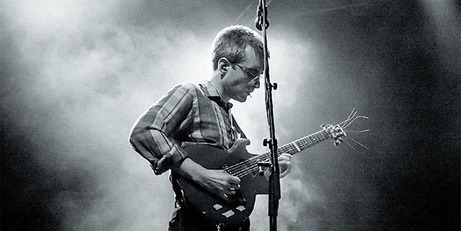
Owen Gardner premieres Where Is My Hand in Space? — a new suite of pieces for microtonal electric guitar and fixed media.
Here, he continues his project of defamiliarizing traditional musical grammar. Gardner treats sound equally as matter and as an articulation of time, while perception is a means to soften the boundaries between performer, audience, and their environment.
Owen Gardner (b.1985, Annapolis, Md.) is a Berlin-based composer, performer, and improviser. His work is guided by the generative tension between experimental and traditional approaches, in solo and ensemble settings, primarily as a guitarist in the leaderless quartet Horse Lords. In addition to his own music, Gardner has performed works by Catherine Lamb, Jackson Mac Low, and Julius Eastman, and has worked with Matmos, Dan Deacon, the Harmonic Space Orchestra, and Future Islands. He also sings early American choral music with Sacred Harp Berlin, studies the theory and instrumental technique of Mauritanian classical music with Sidi ould Ahmed Zeidan, and has programmed and promoted experimental music for many years, both as a member of Baltimore’s High Zero collective and at Berlin’s KM28.
Since 2010, the Graham Foundation has partnered with Lampo to produce an international performance series held at the Madlener House. Lampo, founded in 1997, is a nonprofit organization for experimental music and intermedia projects.
Lampo, established in 1997, supports artists working in new music, experimental sound and other interdisciplinary practices. The Chicago-based organization's core activity has been and remains its performance series. Rather than making programming decisions around tour schedules, Lampo invites selected artists to create and perform new work, and then the organization provides the space, resources and curatorial support to help them fulfill their vision. Lampo also organizes artist talks, lectures, screenings and workshops, and publishes written and recorded documents related to its series.
Note: This event will be held in the ballroom on the third floor of the Madlener House, which is only accessible by stairs. The first-floor galleries and bookshop are accessible via outdoor lift. Please contact us at 312.787.4071 or info@grahamfoundation.org to make arrangements.
Photo: Hansueli Schaerer
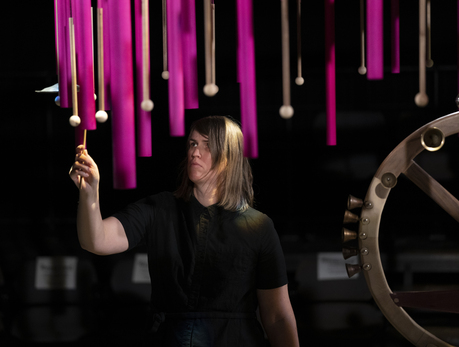
Sarah Hennies premieres Standing Water !!!—her first new composition in five years—and writes that the music “draws from my past work on the vibraphone alongside field recordings and, most significantly, a newfound interest in gongs and other resonant objects.” Hennies reflects, “While my past percussion music often involved long periods of repeating single sounds and chords, this new work operates on a different time scale—more spacious, less physically grueling, but no less focused on immersing the listener in its resonant world.” She concludes, “Originally stemming from work I am doing to document many unheard works by the percussionist/composer Michael Ranta, these instruments have found their way into my own practice in this new solo work and a major duo project with New York bassist Tristan Kasten-Krause.”
Sarah Hennies (b.1979, Louisville) is a composer based in upstate New York whose work is concerned with a variety of musical, sociopolitical, and psychological issues including queer and trans identity, love, intimacy, psychoacoustics, and the social and neurological conditions underlying creative thought. She is primarily a composer of acoustic chamber music, but is also active in improvisation, film, and performance art. She presents her work internationally as both a composer and percussionist with notable performances at MoMA PS1 (NYC), Monday Evening Concerts (Los Angeles), Le Guess Who (Utrecht), Festival Cable (Nantes), send + receive (Winnipeg), O’ Art Space (Milan), Cafe Oto (London), ALICE (Copenhagen), and the Edition Festival (Stockholm). As a composer, she has worked with a wide array of performers and ensembles including Bearthoven, Bent Duo, Claire Chase, ensemble 0, Judith Hamann, R. Andrew Lee, The Living Earth Show, Talea Ensemble, Thin Edge New Music Collective, Two-Way Street, Nate Wooley, and Yarn/Wire.
Her groundbreaking audio-visual work Contralto (2017) explores transfeminine identity through the elements of “voice feminization” therapy, featuring a cast of transgender women accompanied by a dense and varied musical score for string quartet and three percussionists.
Hennies is the recipient of a 2019 Foundation for Contemporary Arts Grants to Artists Award, a 2016 fellowship in music/sound from the New York Foundation for the Arts, and has received additional support from the Fromm Foundation, Mid Atlantic Arts Foundation, New Music USA, the New York State Council on the Arts, and the Creative Work Fund.
As a scholar and performer, she is engaged with ongoing research about the percussion music of Iannis Xenakis and a recording project to document music by the American percussionist and composer Michael Ranta. She teaches at Bard College.
Since 2010, the Graham Foundation has partnered with Lampo to produce an international performance series held at the Madlener House. Lampo, founded in 1997, is a nonprofit organization for experimental music and intermedia projects.
Image: Sarah Hennies performing in A Kind of Ache, 2022. Courtesy the artist. Photo: David Andrews
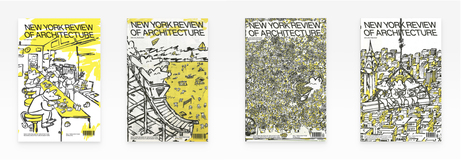
New York Review of Architecture visits Chicago during the Chicago Architecture Biennial opening weekend to connect with Chicago-based contributors and readers. Join New York Review of Architecture and Zach Mortice, Anjulie Rao, and Pete Segall, for readings and conversation at the Graham Foundation.
This program is presented in partnership with the Chicago Architecture Biennial, CAB 5: This is a Rehearsal
New York Review of Architecture is an independent publication that reviews architecture in New York, among other places. In addition to its print issues, New York Review of Architecture also publishes a weekly online newsletter, called Skyline, and hosts events. It serves the public who are too busy building to keep up with the flood of conversation around the built environment with reviews that are concise, engaged, and a little irreverent. New York Review of Architecture was founded in 2019 by Nicolas Kemper, Dante Furioso, Sarah Kasper, James Coleman, and Julie Turgeon. New York Review of Architecture has been supported by the Graham Foundation.
Pete Segall lives in Chicago. His fiction and nonfiction have appeared in The Drift, New York Review of Architecture, Defector, Conjunctions, and elsewhere.
Zach Mortice is a Chicago design journalist and critic that focuses on the intersection of public policy with architecture and landscape architecture.
2021 | New York Review of Architecture, New York Review of Architecture, 2021
http://www.grahamfoundation.org/grantees/6254-new-york-review-of-architecture-2021
2022 | New York Review of Architecture, New York Review of Architecture, 2022
http://www.grahamfoundation.org/grantees/6404-new-york-review-of-architecture-2022
2023 | New York Review of Architecture, Los Angeles Review of Architecture
http://www.grahamfoundation.org/grantees/6530-los-angeles-review-of-architecture
Unless otherwise noted,
all events take place at:
Madlener House4 West Burton Place, Chicago
GALLERY AND BOOKSHOP HOURS
2025 Chicago Architecture Biennial
SHIFT: Architecture in Times of Radical Change
Sep 19, 2025–Feb 28, 2026
Wed–Sat, 12–5 p.m.
CONTACT
312.787.4071
info@grahamfoundation.org
Accessibility
Events are held in the ballroom on the third floor which is only accessible by stairs.The first floor of the Madlener House is accessible via an outdoor lift. Please call 312.787.4071 to make arrangements.
Copyright © 2008–2026 Graham Foundation. All rights reserved.
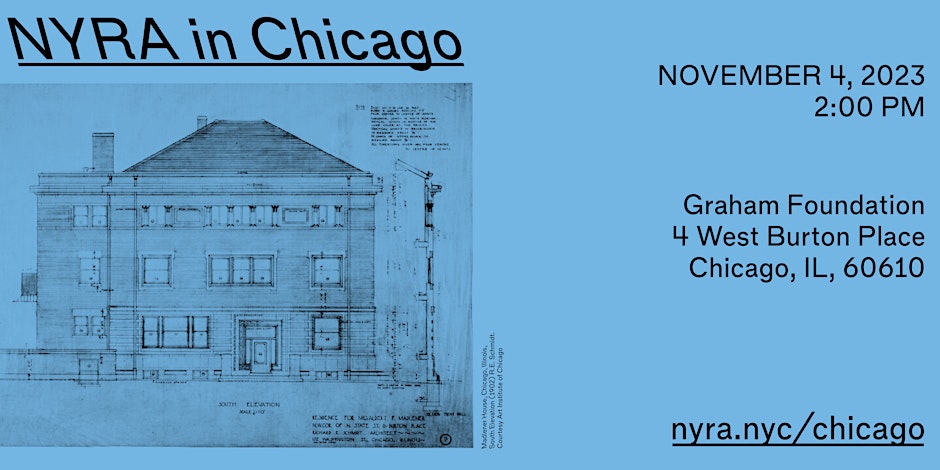
 PREVIOUS POSTS
PREVIOUS POSTS